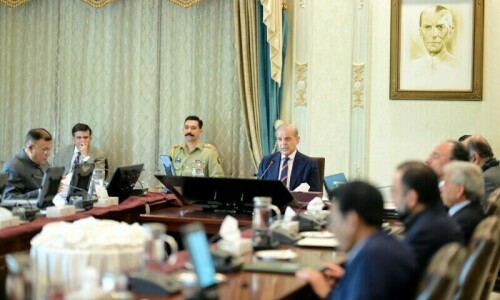WASHINGTON: Asia, which is contributing 60 percent to global growth, is clearly the powerhouse of the global economy, said Krishna Srinivasan, director of the International Monetary Fund (IMF)’s Asia and Pacific Department.
“This is the most dynamic region of the world. It has a huge amount of labor force. A lot of that is also skilled labor force. It’s a region which is highly integrated in global supply chains. And lastly, it’s a region which has seen huge increase in productivity growth,” Srinivasan told Xinhua in an interview earlier this week.
“For these three reasons, this region is contributing a lot more than other regions,” he said. In its latest World Economic Outlook (WEO) report released on Tuesday, the IMF maintained its global growth forecast in 2024 at 3.2pc, consistent with its projection in July. Emerging and developing Asia, meanwhile, is expected to grow 5.3pc.
“Emerging markets in Asia are pulling their weight much more than advanced economies,” as advanced economies are still seeing interest rate tightening and weak domestic demand, Srinivasan said.
Srinivasan says emerging Asian markets ‘pulling their weight better’ than advanced economies
The IMF official noted that going forward, the region also will have to confront the risks of geo-economic fragmentation, impact of artificial intelligence (AI), impact of climate change and so on. The impact of geo-economic fragmentation on Asia is particularly concerning, he said.
According to IMF estimation, there were roughly 1,000 trade-restrictive measures in 2019, but in 2023, the number had surged to 3,000. “A lot of trade-distorting measures are happening, which is leading to greater fragmentation,” Srinivasan said.
“In a region like Asia, which has benefited the most from regional integration and integration of supply chains, any kind of fragmentation means that Asia risks losing the most,” he continued.
The IMF official noted that there is redistribution of trade — for example, Association of Southeast Asian Nations (ASEAN) economies have benefited in some targeted sectors because of the US-China trade war.
However, “over the long term, everybody loses, because the dynamism of the global economy declines, global output declines,” he said.
Noting that IMF research shows that for every trade restriction, whether it’s a tariff or non-tariff barrier, there’s a 74pc probability that countries will retaliate, Srinivasan urged policymakers to focus on ways to reduce these trade restrictions.
The IMF official said the Asia-Pacific Economic Cooperation (APEC) provides a very good forum for such kind of dialogue, as this is a group of 21 economies which account for a large part of global trade.
“So it provides an economic forum, a forum for dialogue between countries on how to alleviate these trade frictions and how to embrace, or how to continue with multilateralism,” he said.
The latest WEO report showed that the Chinese economy is expected to grow by 4.8pc this year, down by 0.2pc points from the previous projection.
Looking ahead, worse-than-expected third-quarter GDP data, combined with recently announced policy support, means that “risks are broadly balanced,” he said.
Noting that many of the measures recently announced by Chinese authorities are consistent with IMF’s suggestions in the Article IV report, Srinivasan said that there still needs to be greater fiscal support from the central government to rehabilitate the property sector.
Published in Dawn, October 28th, 2024














































Dear visitor, the comments section is undergoing an overhaul and will return soon.